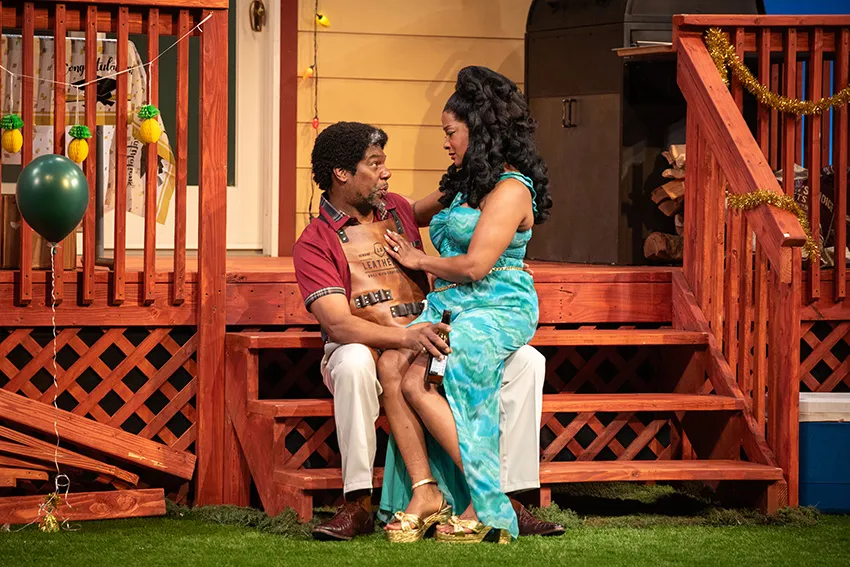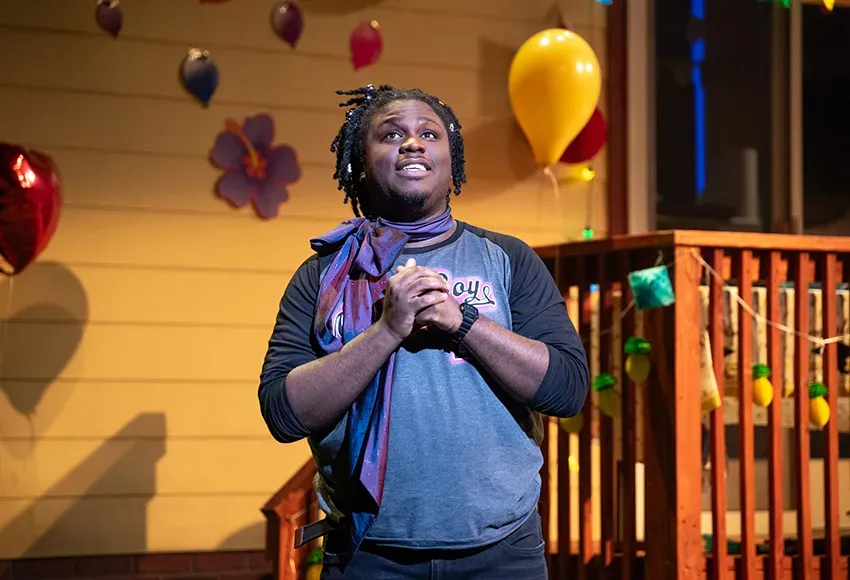FAT HAM
by James Ijames
Seattle Rep
Bagley Wright Hall, Seattle Center
Modern reinterpretations of William Shakespeare's plays always make me apprehensive. So much can go wrong, and no one can hope to improve on these works of genius. James Ijames's Fat Ham, a brilliant comedic reinterpretation of Hamlet seen through the lens of Queer Black joy, is the exception; it's every bit as thought provoking as the original, and a lot more fun. I think Shakespeare himself would have enjoyed seeing his themes and some of his words used in such an inventive, playful manner.
The Broadway production of Fat Ham won the 2022 Pulitzer Prize for Drama and was nominated for a Tony Award for Best Play. The current Seattle Rep production, directed by Timothy McCuen Piggee, ought to win something. It's simply terrific in every respect: script, cast, choreography, and set and costume design.
The central question of Fat Ham isn't "To be or not to be" but "What do we owe to our forebears?" The main character is a college student named Juicy, beautifully played by Taj E.M. Burroughs. Like Hamlet, he feels alienated from his family and uncertain about his life decisions. His abusive father, who tormented him for being "soft," was murdered in prison a week earlier.
At the beginning of the play, Juicy and his good friend Tio (played with skill and humor by Chip Sherman) are half-heartedly setting up a backyard wedding reception for Juicy's mother and uncle. In a genuinely frightening but funny moment, his father's ghost leaps out of a shed, announces that his brother Rev (now Juicy's stepfather) ordered his murder, and demands that Juicy take revenge.
Juicy is torn between the obligation he feels to carry out his father's wishes and his desire to live without violence. When the wedding couple arrive with their friend Rabby (Felicia V. Loud) and her daughter Opal (Aishé Keita) and son Larry (Semaj Miller), whom Juicy has known since childhood, action and snappy dialogue move the plot along swiftly and provide some great entertainment. Everybody has a secret, and all secrets are revealed in time.
There's a game of charades, some karaoke, and plenty of interpersonal dynamics going on. Larry, a straitlaced Marine, has a tender scene with Juicy, leading to a painful betrayal in which the latter, fed up with being the only identified Queer in the group, outs Larry. At this point, it seems that the trajectory of the play might lead to a stage littered with bodies, as it is at the end of Hamlet. But potential tragedy turns back to comedy, as Juicy and his friends choose to live for pleasure rather than harm.

Different forms of manhood
As Juicy's mother, Dedra D. Woods portrays the confusion of a woman drawn to one abusive man after another and struggling to accept her son's softer form of manhood. Reginald André Jackson plays both of her husbands, who have similar personalities but different speaking voices. (Bravo to Jackson for pulling this off.)
Some of the play's funny moments concern Juicy's field of study: human resources. (Opal points out to him, "You're not good with people.") He takes some ribbing about his intellectual pursuits, which include knowledge of Shakespeare, of course. When he quotes a couple of Hamlet's soliloquies, his mother shakes her head and says, "You've been watching too much PBS."
The final scene, a kind of disco epilogue, is quite spectacular – kudos to costume designer Ricky German and choreographer Jimmy Shields. At the performance I attended, the audience's clapping in time to the music – some of us were even dancing in our seats – soon turned into a hearty, well-deserved ovation.
Performances continue through May 12. For more information and to purchase tickets, visit https://seattlerep.org


